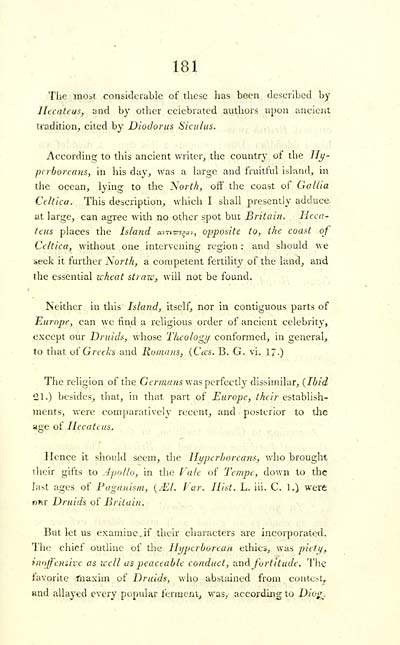Blair Collection > Celtic researches, on the origin, traditions & language, of the ancient Britons
(271)
Download files
Complete book:
Individual page:
Thumbnail gallery: Grid view | List view

181
Tlie moot consideruble of these has been described by
Hticateus, and by other celebrated authors upon ancient
tradition, cited by D'lodorus Siculus.
According to this ancient writer, the country of the 7/y-
pcrboreans, in his day, was a large and fruitful island, in
tJie ocean, lying to the 'North, off the coast of Gallia
Celt lea. This description, which I shall presently adduce
at large, can agree with no other spot but Britain. Heca^
feus places the Island αιτι-ατίξ^^, opposite to, the coast of
Celtica, without one intervening region : and should we
seek it further North, a competent fertility of the land, and
the essential zcheat strazc, will not be found.
Neither in this Island, itself, nor in contiguous parts of
Europe, can we find a religious order of ancient celebrity,
except our Druids, whose Theologi/ conformed, in general,
to that ot' Greeks and Romans, {Cces. B. G. vi. 17.)
The religion of the Germans was perfectly dissimilar, (Ibid
21.) besides, that, in that part of Europe, their establish-
ments, were comparatively recent, and posterior to tlie
age of Hecatcus.
Hence it should seem, the Hyperboreans, who brought
their gifts to J polio, in the Vale of Tempe, down to the
last ages of Paganism, {/EL Far. Hist. L. iii. C. 1.) were
©Rr Druids of Britain.
But let us examine, if their characters are incorporated.
The chief outline of the Hi/pcrborean ethics, was pietj/,
inoffensive as ic ell as peaceable conduct, ana fortitude. The
favorite tiiaxim of Druids, who abstained from contc^t,
and allayed every popular ferment, was, according to Diog.
Tlie moot consideruble of these has been described by
Hticateus, and by other celebrated authors upon ancient
tradition, cited by D'lodorus Siculus.
According to this ancient writer, the country of the 7/y-
pcrboreans, in his day, was a large and fruitful island, in
tJie ocean, lying to the 'North, off the coast of Gallia
Celt lea. This description, which I shall presently adduce
at large, can agree with no other spot but Britain. Heca^
feus places the Island αιτι-ατίξ^^, opposite to, the coast of
Celtica, without one intervening region : and should we
seek it further North, a competent fertility of the land, and
the essential zcheat strazc, will not be found.
Neither in this Island, itself, nor in contiguous parts of
Europe, can we find a religious order of ancient celebrity,
except our Druids, whose Theologi/ conformed, in general,
to that ot' Greeks and Romans, {Cces. B. G. vi. 17.)
The religion of the Germans was perfectly dissimilar, (Ibid
21.) besides, that, in that part of Europe, their establish-
ments, were comparatively recent, and posterior to tlie
age of Hecatcus.
Hence it should seem, the Hyperboreans, who brought
their gifts to J polio, in the Vale of Tempe, down to the
last ages of Paganism, {/EL Far. Hist. L. iii. C. 1.) were
©Rr Druids of Britain.
But let us examine, if their characters are incorporated.
The chief outline of the Hi/pcrborean ethics, was pietj/,
inoffensive as ic ell as peaceable conduct, ana fortitude. The
favorite tiiaxim of Druids, who abstained from contc^t,
and allayed every popular ferment, was, according to Diog.
Set display mode to: Large image | Transcription
Images and transcriptions on this page, including medium image downloads, may be used under the Creative Commons Attribution 4.0 International Licence unless otherwise stated. ![]()
| Early Gaelic Book Collections > Blair Collection > Celtic researches, on the origin, traditions & language, of the ancient Britons > (271) |
|---|
| Permanent URL | https://digital.nls.uk/75766876 |
|---|
| Description | A selection of books from a collection of more than 500 titles, mostly on religious and literary topics. Also includes some material dealing with other Celtic languages and societies. Collection created towards the end of the 19th century by Lady Evelyn Stewart Murray. |
|---|
| Description | Selected items from five 'Special and Named Printed Collections'. Includes books in Gaelic and other Celtic languages, works about the Gaels, their languages, literature, culture and history. |
|---|

